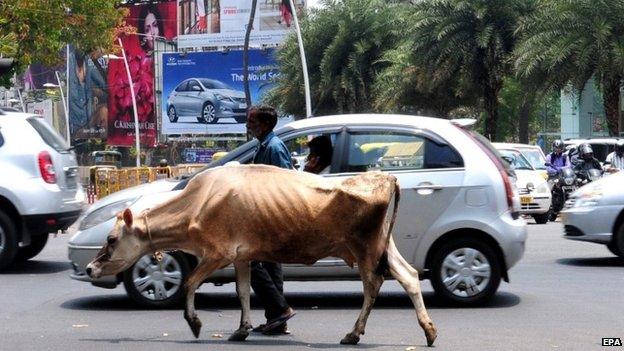Why beef ban in Indian state undermines secularism
- Published

India's Hindu majority regard cows as divine
It is a bizarre image: cops demanding mug-shots of cows, external rather than crooks.
But that's what officers in the city of Malegaon in Maharashtra, one of India's most populous states, are doing in an attempt to enforce its new beef ban.
"We are keeping the photographs for verification purposes only," one policeman told an Indian newspaper, external. "If someone alleges that some illegal activity has taken place and if the owner has a photo, it will be easy to establish the truth."
I'm not sure that's right. How do you match a steak with a photo of a cow?
But, to be fair, this is a tough law to enforce. You'd pretty much have to catch the newly criminalised butchers with their hands in a cow carcass - literally "red-handed" - to be certain of conviction.
That's because, without DNA analysis or a very refined palate, it is hard to tell the difference between beef and buffalo meat.
Unfortunately for India's buffaloes, they aren't regarded as close enough to God to deserve protection. Buffalo is banned in just one of the country's 29 states.
Beef, meanwhile, is already banned in most of northern and western India, and there are partial bans in most of the rest of the country.
So, why the beef about tightening the laws in a single state?
There is an economic issue here.
Beef is significantly cheaper than chicken and fish and is part of the staple diet for many Muslims, tribal people and dalits - the low caste Indians who used to be called untouchables. It is also the basis of a vast industry which employs or contributes to the employment of millions of people.
But, as with so much conflict in the world, the real reason the ban is such a sensitive issue here is religion.
The Hindu majority - 80% of the country's 1.2 billion people - regard cows as divine; the 180 million-strong Muslim minority see them as a tasty meal.
Many Muslims see the extension of the beef ban as evidence of an assault on one of the key principles on which independent India was founded - secularism.
Secularism in India means something a little different from elsewhere. It doesn't mean the state stays out of religion, here it means the state is committed to supporting different religions equally.
India's secularism was a response to horrors of the partition when millions of people were murdered as Hindus and Muslims fled their homes. The country's first prime minister, Jawaharlal Nehru, argued equal treatment was a reasonable concession to the millions of Muslims who'd decided to risk all by staying in India.
But India is now governed by a Hindu nationalist party, the BJP. It sees India as a Hindu nation.
The party leader and Prime Minister Narendra Modi has repeatedly reasserted his commitment to secularism yet the party has supported the clampdown on beef in Maharashtra.
That's why while the idea of cow mug shots may be amusing, the beef ban is deadly serious.
India's triumph has been forging a nation in which Hindus and Muslims can live happily together. The fear is that the beef ban is part of a process that is gradually undermining the compromises that made that possible.